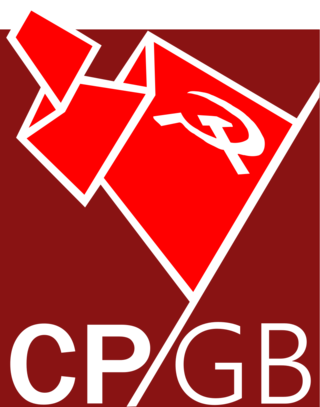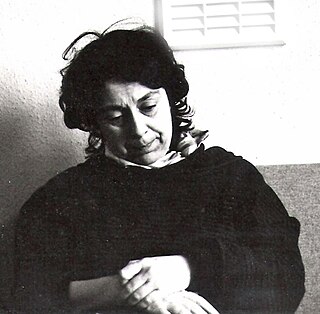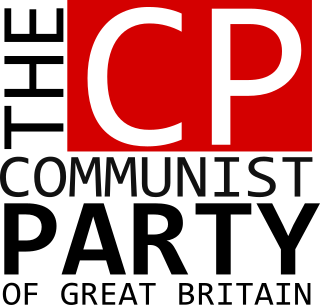Related Research Articles
Left-wing politics describes the range of political ideologies that support and seek to achieve social equality and egalitarianism, often in opposition to social hierarchy as a whole or certain social hierarchies. Left-wing politics typically involve a concern for those in society whom its adherents perceive as disadvantaged relative to others as well as a belief that there are unjustified inequalities that need to be reduced or abolished through radical means that change the nature of the society they are implemented in. According to emeritus professor of economics Barry Clark, supporters of left-wing politics "claim that human development flourishes when individuals engage in cooperative, mutually respectful relations that can thrive only when excessive differences in status, power, and wealth are eliminated."

The Communist Party of Spain is a communist party that, since 1986, has been part of the United Left coalition, which is currently part of Sumar. Two of its politicians are Spanish government ministers: Yolanda Díaz and Sira Rego.

The Communist Party of Great Britain is a political group which publishes the Weekly Worker newspaper. The CPGB (PCC) claims to have "an internationalist duty to uphold the principle, 'One state, one party'. To the extent that the European Union becomes a state then that necessitates EU-wide trade unions and a Communist Party of the EU". In addition, it is in favour of the unification of the entire working class under a new Communist International. It is not to be confused with the former Communist Party of Great Britain, the Communist Party of Great Britain (Marxist–Leninist), or the current Communist Party of Britain.
The Labor Right is a political faction of the Australian Labor Party (ALP) at the national level that is characterised by being more economically liberal or more socially conservative than the Labor Left. The Labor Right is a broad alliance of various state factions and competes with the Labor Left faction.

The Communist Party (British Section of the Third International) was a Left Communist organisation established at an emergency conference held on 19–20 June 1920 at the International Socialist Club in London. It comprised about 600 people.
Labor history is a sub-discipline of social history which specializes on the history of the working classes and the labor movement. Labor historians may concern themselves with issues of gender, race, ethnicity, and other factors besides class but chiefly focus on urban or industrial societies which distinguishes it from rural history.
Hard left or hard-left is a term that is used particularly in Australian and British English to describe the most radical members of a left-wing political party or political group. The term is also a noun and modifier taken to mean the far-left and the left-wing political movements and ideas outside the mainstream centre-left. The term has been used to describe wings and factions of several political parties across the world, such as the left-wing of the Labour Party in the United Kingdom and left-wing factions of the Australian Labor Party.
A big tent party, or catch-all party, is a term used in reference to a political party having members covering a broad spectrum of beliefs. This is in contrast to other kinds of parties, which defend a determined ideology, seek voters who adhere to that ideology, and attempt to convince people towards it.

The Northern Ireland Public Service Alliance (NIPSA) is a trade union in Northern Ireland affiliated to the Irish Congress of Trade Unions. It is the largest trade union in Northern Ireland, with around 46,000 members, and is organised into two groups, the Civil Service Group, for the staff of public bodies employed on civil service terms and conditions, and the Public Officers Group, for employees of education and library boards, health and social services boards, the Northern Ireland Housing Executive, district councils, other public bodies and voluntary organisations.
Social democracy is a political, social, and economic philosophy within socialism that supports political and economic democracy and a gradualist, reformist and democratic approach towards achieving socialism. In practice, social democracy has taken the form of socially managed welfare capitalism, and emphasizes economic interventionism, partial public ownership, a robust welfare state, policies promoting social equality, and a more equitable distribution of income.
Alan Johnson is a British political theorist and activist. He is a senior research fellow at the Britain Israel Communications and Research Centre. Previously he was Professor of Democratic Theory and Practice at Edge Hill University.
The Labour Party is a social democratic political party in the United Kingdom that sits on the centre-left of the political spectrum. In a broader sense, the party has been described as an alliance of social democrats, democratic socialists and trade unionists. It is the governing party of the United Kingdom, having won the 2024 general election, and is currently the largest political party by number of votes cast and number of seats in the House of Commons. There have been seven Labour prime ministers and fourteen Labour ministries. The party traditionally holds the annual Labour Party Conference during party conference season, at which senior Labour figures promote party policy.

Nina Fishman was an American-born English labour movement historian and political activist.

The Labour Party is a left-wing and populist political party in Argentina. It was created in 1945 by prominent leaders of the trade union movement in Argentina shortly before the 1946 Argentine general election and mobilized working-class support for emerging populist leader Juan Perón. The party run Perón’s presidential ticket for the election. It was inspired and based on the British Labour Party and is considered to have been the first instance of direct electoral mobilization of the working class in Argentina. Its goal was to bring Perón to power and institutionalize the political power of Argentinian trade union movement. After winning the 1946 presidential election, Perón merged the party into his Peronist Party.
Democratic socialism is a left-wing set of political philosophies that supports political democracy and some form of a socially owned economy, with a particular emphasis on economic democracy, workplace democracy, and workers' self-management within a market socialist, decentralised planned, or democratic centrally planned socialist economy. Democratic socialists argue that capitalism is inherently incompatible with the values of freedom, equality, and solidarity and that these ideals can only be achieved through the realisation of a socialist society. Although most democratic socialists seek a gradual transition to socialism, democratic socialism can support revolutionary or reformist politics to establish socialism. Democratic socialism was popularised by socialists who opposed the backsliding towards a one-party state in the Soviet Union and other nations during the 20th century.

The Communist Party of Britain (CPB) is a communist party in Great Britain which emerged from a dispute between Eurocommunists and Marxist-Leninists in the Communist Party of Great Britain in 1988. It follows Marxist-Leninist theory and supports what it regards as existing socialist states. The party has fraternal relationships with the ruling parties in Cuba, China, Laos, and Vietnam. It is affiliated nationally to the Cuba Solidarity Campaign and the Venezuela Solidarity Campaign. It is a member of the International Meeting of Communist and Workers' Parties, together with 117 other political parties. After the fall of the Soviet Union, the party was one of two original British signatories to the Pyongyang Declaration.

The Communist Party of Great Britain (CPGB) was the largest communist organisation in Britain and was founded in 1920 through a merger of several smaller Marxist groups. Many miners joined the CPGB in the 1926 general strike. In 1930, the CPGB founded the Daily Worker. In 1936, members of the party were present at the Battle of Cable Street, helping organise resistance against the British Union of Fascists. In the Spanish Civil War, the CPGB worked with the USSR to create the British Battalion of the International Brigades, which party activist Bill Alexander commanded.

A popular front is "any coalition of working-class and middle-class parties", including liberal and social democratic ones, "united for the defense of democratic forms" against "a presumed Fascist assault". More generally, it is "a coalition especially of leftist political parties against a common opponent". However, other alliances such as the Popular Front of India have used the term, and not all leftist or anti-fascist coalitions use the term "popular front".
References
- ↑ "Mission Impossible? Fight to reconquer Labour, or build a broad left party?". Socialist Resistance. Retrieved 7 March 2015.
- ↑ J. David Edelstein, Malcolm Warner (1979). Comparative Union Democracy: Organisation and Opposition in British and American Unions. Transaction Publishers. p. 365. ISBN 0-87855-623-0.
- ↑ McIlroy, John (1 January 1995). Trade Unions in Britain Today (illustrated ed.). Manchester University Press. p. 175. ISBN 9780719039836 . Retrieved 7 March 2015.
- ↑ Seymour, Richard. "Left Unity: A Report From The Founding Conference". newleftproject.org. New Left Project. Archived from the original on 2 April 2015. Retrieved 3 March 2015.
{{cite web}}: CS1 maint: unfit URL (link)